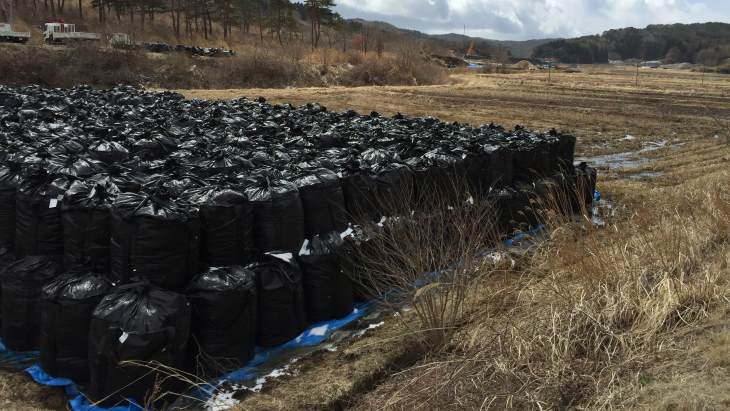About 13 million cubic metres of soil and about 300,000 cubic metres of ash from incineration of organic material was removed as part of decontamination activities in Fukushima Prefecture and stored at an interim storage facility covering an area of 16 square kilometres, spanning across Okuma Town and Futaba Town.
The management of removed soil is governed by a Japanese law which permits the government to repurpose the soil both within and outside of Fukushima Prefecture and for final disposal of the remaining soil to take place outside of the Fukushima Prefecture by 2045.
Japan plans to recycle roughly 75% of the removed soil - the soil which has low levels of radioactivity – by using it, if demonstrated safe, for civil engineering structures including embankments for roads, railways, seawalls, waste treatment sites, coastal protection, agricultural land, and land reclamation. The remaining soil which cannot be recycled will be disposed of permanently and Japan intends to confirm the site selection and disposal process in 2025.
In response to Japan's request in October 2022 for a safety review of its plans, an International Atomic Energy Agency (IAEA) team – comprised of five IAEA staff and six international experts from Belgium, Germany, Japan, the UK, and the USA - conducted three international expert missions in May 2023, October 2023 and February 2024. The IAEA's review included providing advice and support to Japan from both technical, including safety aspects, and social viewpoints.
The IAEA assessed the approach of Japan's Ministry of Environment for the managed recycling and the final disposal of removed soil and radioactive waste against the IAEA Safety Standards. These safety standards serve as a global reference for protecting people and the environment and contribute to a harmonised high level of safety worldwide.
The team presented its report to Japan's Minister of the Environment Shintaro Ito on 10 September.
"We appreciate the enormity of the challenge facing Japan in dealing with the aftermath of the 2011 Fukushima Daiichi accident and we commend the country for requesting our impartial and technical review of its plans," said IAEA Director General Rafael Mariano Grossi. "The recycling and disposal of the soil further contributes to the reconstruction of areas affected by the accident."
He added: "The IAEA found the Ministry of Environment's proactive approach to managing removed soil and waste arising from decontamination activities reflects a commitment to ensuring safety, protecting public health and promoting environmental sustainability in Fukushima Prefecture and beyond. The IAEA is committed to engaging with Japan on the managed recycling and the final disposal of removed soil and waste through future follow-up assessments of the Ministry's approach."








_97013.jpg)






